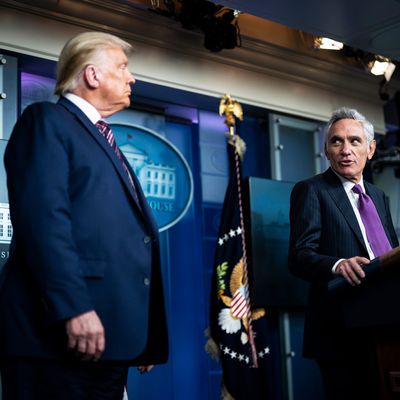
The implosion of the last Republican administration was in large part the story of conservative ideology defeating empiricism. George W. Bush dismissed intelligence and foreign-policy professionals who questioned the Iraq weapons claims and pressed the need to plan for an occupation as small-minded bureaucrats disloyal to his grand vision. (The term “deep state” was not then in wide circulation, but had it been, Bush’s loyalists surely would have embraced it.) Instead he followed the advice of neoconservative ideologues who flattered his instincts and self-image, and thus plunged his presidency into a fiasco from which it never recovered.
The apparent pandemic-induced implosion of the current Republican administration has followed a similar course. Faced with a different sort of crisis than the one presented to Bush, President Trump ignored public-health experts, and instead elevated ideological cranks. The main difference is that, while Bush energetically covered up his war on expertise, Trump’s is playing out in plain sight.
Conservative intellectuals have spent years indignantly denying that they harbor some categorical distrust of science. Trump, as he so often does, dispenses with the evasions and plausible deniability and blurts out the actual belief. “He’ll listen to the scientists,” Trump sneered of his opponent. “If I listened totally to the scientists, we would right now that would have a country that would be in a massive depression … People are tired of hearing Fauci and these idiots, all these idiots who got it wrong.”
Trump’s irritation with public-health experts, and their tedious warnings that the pandemic must be curtailed, is long-standing. In August, the Washington Post reported that Trump had “encouraged his White House advisers to find a new doctor who would argue an alternative point of view from Birx and Fauci, with whom the president has grown increasingly annoyed for public comments that he believes contradict his own assertions that the virus’s threat is receding.” The advisers “sought a doctor with Ivy League or top university credentials who could make the case on television that the virus is a fading danger.” They settled on Scott Atlas.
Atlas is a radiologist, not an epidemiologist, and possesses essentially no expertise relevant to a pandemic. What he has, instead, is a medical credential — trust him, he’s a doctor — which he uses to ward off expertise. Atlas spent years in the right-wing think-tank world cranking out standard-issue doggerel about the glories of free-market health care and the dangers of doing anything to cover the uninsured.
Atlas embraced a counterintuitive theory about the coronavirus that had taken hold on the right, and which ran along the lines of conservative thinking on problems like climate change. The pandemic was, if not quite a hoax, overblown. So-called “authorities” were using the alleged crisis as a pretext to extend government power. One of Atlas’s colleagues at the Hoover Institute, law professor Richard Epstein, insisted the coronavirus would kill only 500 Americans. (He quickly conceded this was a tabulation error, and revised his total to 5,000, which is still more than 200,000 shy of the current running total.)
And public-health authorities have arrived at their conclusions bumpily, as scientists usually do. Experts took months to establish the virus was airborne. American officials, worried about an initial mask shortage that would deny protection to the most critical first responders, tried to prevent hoarding by disastrously warning that masks weren’t helpful. Officials still have not come to a firm agreement on what sort of gatherings should be allowed.
But while the mainstream has moved asymptotically toward firmer ground, Atlas and his cranks have dug in to their increasingly absurd contrarian ground. He has continued to insist the United States is close to achieving herd immunity, and thus can allow most Americans to resume all normal activity, even as the vast bulk of scientists insist herd immunity is nowhere close and that such a plan would unleash mass death.
Atlas has even opposed moderate measures that would contain the pandemic without closing down economic activity. He helped block a national mandate to require masks on public transportation. He refused to support plans to expand national testing, another measure that allows public-health officials to isolate outbreaks without resorting to mass shutdowns. The administration, incredibly, has spent months resisting Democratic stimulus proposals in part because they would expand testing.
But these arguments dovetail with Trump’s desire to ignore the pandemic. As Trump has said many times, more tests mean more confirmed cases, and his desire is to pretend the pandemic is disappearing. Atlas has taken control of his administration’s coronavirus response, dissolving the task force, and consigning Fauci and Brix to irrelevance. When Brix, a devoted team member who has suppressed any hint of dissatisfaction, complained to Mike Pence that Atlas was spreading misinformation, Pence told her and Atlas to “work out their disagreements themselves.” (This is the same stance that Trump has taken when Ukraine complained about Russia’s invasion, and it has had the same effect, allowing the stronger party to prevail.)
Trump has been trailing Biden in the polls for more than a year, so if he loses, the coronavirus will hardly be the sole cause. But it may well be recorded as his most consequential failure. And in the light of history, it may be seen less as a reflection of his personal inadequacies than a continuation of his party’s intellectual insularity. Trump has refused to undertake even the most obvious steps to control the pandemic not because he ignored conservative orthodoxy, but because he listened to it.






























